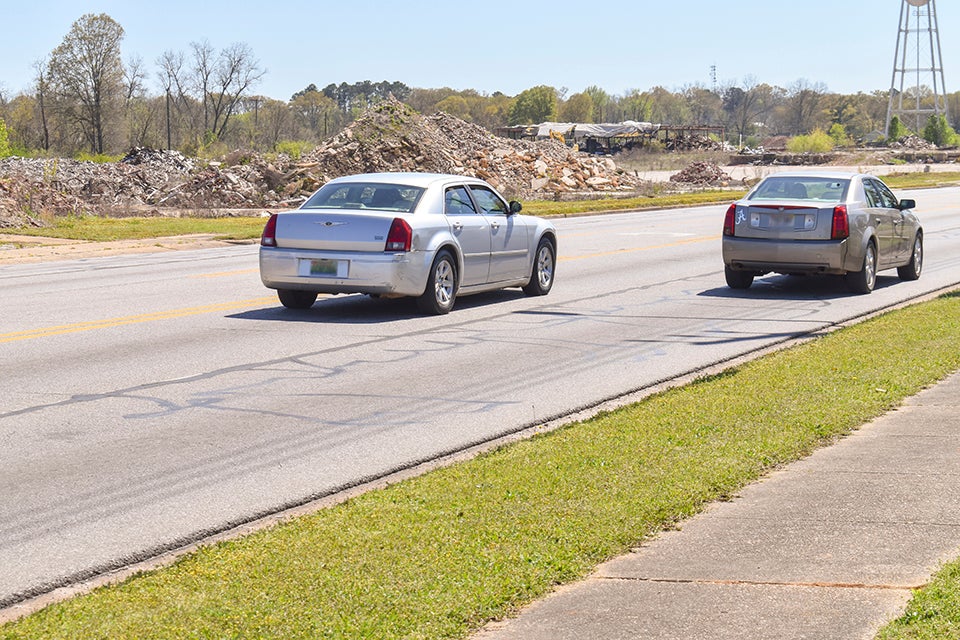House to consider hands-free law in Alabama
Published 6:00 pm Wednesday, March 27, 2019

- Cars drive along Highway 29 in Lanett on the afternoon of Wednesday, March 27, 2019.
MONTGOMERTY — The Alabama House of Representatives is working on a bill that would make it illegal to hold any electronic device while driving.
Currently, Alabama law bans texting and reading text messages while driving, but there isn’t anything that prohibits holding a cell phone to a person’s ear while on the road. The new bill sponsored by Rep. Allen Farley, R-McCalla, would expand that law to make holding a cell phone while driving illegal.
The bill was proposed by Farley due to the death of Camryn Callaway, a 17-year-old Thompson High School student in Alabaster, who would have turned 18 this past week. Farley said she was using her phone to send a Snapchat message to her friend when she drove under an 18-wheeler stopped in her lane due to construction on I-65.
Farley said the bill will be named CiCi’s law.
He said Callaway’s mother, Michelle Lunsford, spoke to the Public Safety and Homeland Security House Committee on March 20 about the death of her daughter in February 2018. After Lunsford spoke, the bill was voted to unanimously move to the full house.
“That is what finally prompted me to move for this hands-free driving law,” Farley told the Valley Times-News Wednesday. “These types of accidents are preventable. All you have to do is put the phone down.”
The actual language in the bill says it would “prohibit a person from holding or otherwise using his or her body to support a wireless communication device or standalone electronic device while operating a motor vehicle.”
According to the bill, hands-free, voice-based communication is exempt and so are dash cams and back up cameras. Law enforcement officers on duty are excluded, as are contractors responding to a utility emergency.
Anyone needing to use a phone to call emergency services — police, fire, ambulance — are also excluded from the law. The use of GPS is allowed but manually inputting a destination while driving is prohibited. Motorists can use an earpiece or other hands-free device while driving as long as it does not require the use of more than a single button to start or end the call.
A first offense of the law would result in a $50 fine and a two-point violation on that person’s driver’s license. That penalty increases to $100 for the second offense, along with another two-point driver’s license hit and then $150 for the third and each subsequent offense as well as a three-point violation on a driver’s license.
“It won’t take long and that person’s license would be suspended if they continue to use a phone,” Farley said.
According to the DMV, 12 points on a driver’s license triggers a suspension of 60 days. The penalties go up with more points.
“I am hoping that it is enough of a penalty to stop it,” Farley said.
According to the National Safety Council, cell phone use leads to 1.6 million vehicle crashes every year. The National Highway Traffic Safety Administration reports 3,450 people died in distracted driving accidents in 2016.
Rep. Debbie Wood, R-Valley, said for safety, this bill is necessary.
“Stats show there are more accidents today within a specific age range, and we feel like it is due to social media and people trying to keep up and people reading texts and checking social media,” he said.
She said that’s the way people communicate in today’s world, but it shouldn’t happen behind the wheel of a vehicle.
“I think a hands-free bill would be absolutely perfect,” Wood said.
Farley said professional drivers with CDL licenses have been under a federal mandate to not hold electronic devices for 10 years. He said if caught with a mobile device, the driver can face a fine up to $2,500 and the company employing the driver can face an $11,000 fine.
“If the people driving vehicles would get under the same restrictions as the professional drivers, imagine the lives we could save,” he said.
The Georgia Legislature passed a similar law in 2018 that took effect July 1. Farley said he mirrored the same law proposed in Alabama.
According to the Georgia Department of Transportation, traffic fatalities fell 2.3 percent in 2018 compared to 2017.




